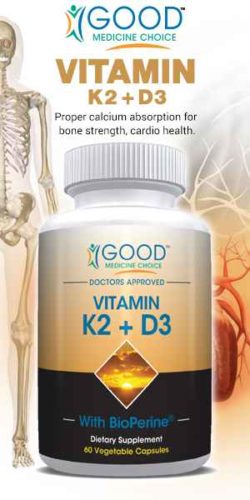A new clinical trial will test the effects of vitamin D supplements on COVID-19COVID-19 \ ˈkō-vid-nīn-ˈtēn : a mild to severe respiratory illness that is caused by a coronavirus (Severe acute respiratory syndrome coronavirus 2 of the genus Betacoronavirus), is transmitted chiefly by contact with infectious material (such as respiratory droplets), and is characterized especially by fever, cough, and shortness of breath and may progress to pneumonia and respiratory failure. patients to determine if vitamin D can help fight COVID-19 illness. Research shows vitamin D helps prevent acute respiratory distress syndrome (ARDS) and plays a role in inhibiting inflammatory reactions, both of which contribute to severity and death in COVID-19 patients.
Several small studies have found a correlation between severe vitamin D deficiency and COVID-19 death rates. These studies indicated, in general, that people in countries with high COVID-19 mortality rates had lower levels of vitamin D compared with patients in countries that were not as severely affected.
There is no direct causal link yet between vitamin D deficiency and increased susceptibility to COVID-19.
Study of Vitamin D Supplements & COVID-19 Severity
Taking vitamin D to mitigate the threat of COVID-19 was one of the earliest suggestions to come from virusvirus vi·rus | \ ˈvī-rəs : a disease-causing agent that is too tiny to be seen by the ordinary microscope, that may be a living organism or may be a very special kind of protein molecule, and that can only multiply when inside the cell of an organism researchers in China. Now a new clinical trial will test the effects of vitamin D supplements on COVID-19 patients who have not yet developed severe symptoms of the disease. The study is being conducted by Arizona State University in conjunction with the Southwest College of Naturopathic Medicine.
Researchers will administer supplemental vitamin D to COVID-19 positive patients who are found to have a vitamin D deficiency. After two weeks, researchers will measure participants’ vitamin D levels and measure any changes in the severity of COVID-19 symptoms. The phase 1 clinical trial will continue to track symptoms at four weeks and six weeks after initial treatment.
In addition to measuring vitamin D, the study will also measure other nutrients that are important for overall health, such as vitamin C, which is vital to your body’s healing process.
Vitamin D’s Role in the Body’s Immune System

Vitamin D also facilitates absorption of calciumDietary supplement used to promote bones, muscles, and heart to function properly. Bones in the body do not producer calcium, although it can be taken through foods and vitamins. Calcium in the bloodstream is used to send nerve signals, release hormones like insulin and regulate how muscles and blood vessels contract and dilate. and phosphate, which are needed for bone growth and strength. A growing body of evidence suggests a synergistic effect of vitamin K combined with vitamin D. Vitamin K also activates proteins that play a role in blood clotting, calcium metabolism and heart health. Vitamin D3A pro vitamin that stimulates calcium and phosphate absorption from the small intestine and promotes secretion of calcium from bone to blood. This helps your body absorb calcium and phosphorus, This is important for building bones and preventing bone disease. It can also support immune, brain, and nervous system health. and vitamin K2Vitamin K2 activates proteins that play a role in blood clotting, calcium metabolism, and heart health. This is important for the calcification of bones and prevents the calcification of blood vessels and kidneys because it regulates calcium deposition. ensure that calcium is absorbed easily and reaches the bone mass, while preventing arterial calcification, or clogged arteries.
Interested in finding out more about Good Medicine Choice all-natural Vitamin K2 + Vitamin D3 with BioPerinePatented extract from black pepper to obtain the amide alkaloid Piperine. This increases nutrient absorption of nutrients such as Calcium and and Vitamin C. BioPerine can also act as an anti- inflammatory. One way BioPerine increases nutrient absorption is by increasing your metabolism by improving thermogenics. This process essentially breaks down your fat cells and increases your internal temperature. dietary supplements? Click link to read more.
Who is More Vitamin D Deficient?
Only about 10% of the vitamin D in our bodies originates from food. The remainder is synthesized in the skin through exposure to ultraviolet light in sunlight. Vitamin D deficiency is more common among people over 65, those who are Black or of Asian origin and people with darker skin, those whose nutrition is lacking in fish and dairy, and individuals with obesity. Higher body mass index (BMI), older age, and socioeconomic deprivation are all factors that could affect both the risk of COVID-19 and levels of the vitamin. These groups of people are also known to have an increased risk of developing severe COVID-19.
Some medications such as laxatives, steroids and cholesterol-lowering drugs also inhibit absorption of vitamin D.
Should I take a Vitamin D Supplement?
Vitamin D helps support the immune system and can also help prevent infections in the upper respiratory tract. The UK’s National Health Service, recommends that people take a daily supplement containing 10 
“Vitamin D deficiency is associated with an increased risk of both respiratory viral infections and inflammatory conditions. Vitamin D has an important regulatory role in the human immune system, so a deficiency of vitamin D is likely to cause immune dysregulation, which may reduce the first line of our defense against COVID-19,” the authors said. “It is therefore biologically plausible that vitamin D deficiency may contribute to susceptibility to COVID-19 infection.”
According to a 2020 review, 50% of the worldwide population has insufficient levels of vitamin D. In the United States, 35% of adults have the deficiency.
Recommended Vitamin D levels
For most people, the recommended daily allowance (RDA) is 400 to 600 IU (international units) per day for adults with inadequate sun exposure. Vitamin D supplementation of 700 to 800 IU per day reduces fractures in older adults. To prevent vitamin D deficiency, the recommended intake of vitamin D is 400 IU per day for infants and children with inadequate sun exposure.
You can order Good Medicine Choice Vitamin K2+D3 online; shipping is included in price.
Symptoms of Vitamin D Deficiency
Lack of vitamin D plays a role in heart diseaseheart disease : an abnormal condition of the heart or of the heart and circulation (such as coronary heart disease, arrhythmia, or heart-valve defect) and high blood pressure, diabetes, autoimmune diseases, osteoarthritis, and some cancers, including prostate and breast cancer.
Excessive fatigue and tiredness may be a sign of vitamin D deficiency. Taking supplements may help improve energy levels.
Other symptoms of vitamin D deficiency include:
- Bone & Joint Pain
- Fatigue
- Back Pain
- Frequent Infections or Illness
- Depression
- Slow Wound Healing
- Bone Fractures
- Hair Loss
About Good Medicine Choice®, Inc.
Good Medicine Choice®, Inc. launched The Good Medicine Choice Network website in response to the coronaviruscoronavirus co·ro·na·vi·rus : any of a family (Coronaviridae) of single-stranded RNA viruses that have a lipid envelope studded with club-shaped projections, infect birds and many mammals including humans, and include the causative agents of MERS, SARS, and COVID-19 pandemic this spring. The health education website offers guidance and a line of vitamins and dietary supplements for maintaining a healthy immune system.
Visit the Good Medicine Choice Network Shop to explore GMC’s anti-inflammatory and antioxidant dietary supplements, multivitamins and essential oils. All product prices include shipping costs.


No comments yet. Be the first one to leave a thought.